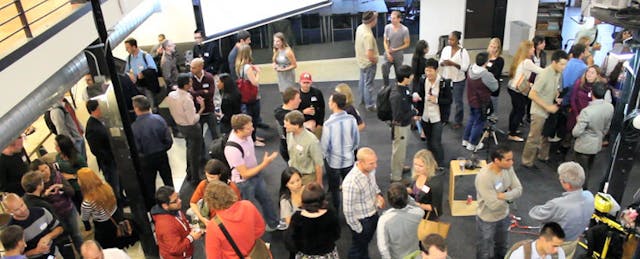At the SF EdTech Meetup on August 16th, EdSurge shared ten trends worth keeping an eye on--and maybe even worth questioning. Here they are, in their full glory. Let us know if you agree--or are spotting other trends.
- Tabalicious: Whiteboards are on the decline (watch out for the free-falling market prices of Promethean and SMART Technologies shares). Tablets are taking the market by storm.
- MOOC Fever: Coursera recently topped a million registrations. Udacity is inching towards 750,000. Online courses are getting buy-in from folks in all walks of life: students, professionals, investors, professors--and even entire universities. The money question: will employers follow?
- Make It Yourself: The Make movement is taking off, with both extravaganzas like Maker Faire (where we ran a pavilion) and local Makerspaces nurturing the maker spirit in kids and adults alike. Sites like DIY.org encourage kids and parents to share homemade creations. Raspberry Pi mini computers are a hot holiday item; LittleBits just raised funding. Watch out: even the Dept. of Ed is becoming a Maker fan.
- Rise of the Teacherpreneurs: Teachers-turned-entrepreneurs are taking matters into their own hands. Startups co-founded by former-teachers are gaining traction--and investments. (See Class Dojo.) Events such as Startup Weekend EDUs and mobile hackathons provide avenues for teachers to share their pain, brainstorm solutions and meet developers and biz folks who can help. Hat tip to the Center for Teaching Quality for the concept.
- Futurespeak: What adjectives will we see in edtech articles and press releases a year from now? "Adaptive" is just plain ol' boring--how about "hyperadaptive?" And why does everything have to be a revolution? How about an "insurrection?"
- Data Plumbing: With promises of "personalized" and "individualized" software come the gritty work of data mining and crunching. Ongoing projects like the Shared Learning Collaborative and startups like Clever and LearnSprout are hoping to make life a little easier for developers and administrators alike. This is essential, ground-breaking work.
- Common Core: These standards are making big promises, from reducing the achievement gap to improving the U.S. international rankings. Still unclear is how to carry out these grand goals. The two companies creating Common Core-aligned assessments, SmarterBalance and PARCC, say the tests won't be ready until 2015.
- Ecosystems: Communities bringing together all the stakeholders in the edtech space--startups & big companies, parents & teachers, schools & districts--are emerging, and not just in SF and NY. There are compelling signs of life of these ecosystems emerging in Baltimore, New Orleans, Austin, and yes, even shiny Las Vegas.
- Ka'ching: Venture capital in edtech for 2011 was nearly triple the amount a decade ago. That growth remains strong in 2012, with investors sticking around for late-stage rounds. But in order to keep them interested, they will want to see a big liquidity event soon, say, within 18 months. (2Tor, are you listening?)
- Tug-o'-War: The quarreling over the role of for-profits and non-profits in education will only get loud. But a fact of life is that startups need capital to grow and scale, and investors--even mission-driven ones-- aren't likely to help unless there's a reasonable chance of turning a profit. This means that well-intentioned entrepreneurs--even teachers themselves--will have to make the case that there's a pot of gold at the end of the road. What trumps this whole debate? Great products. Companies that make awesome stuff that people are willing to buy don't usually get flak for how much they're pocketing. Case in point: Apple. So build the good stuff, fellow edsurgents!


